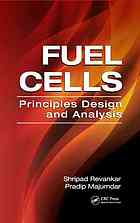

Most ebook files are in PDF format, so you can easily read them using various software such as Foxit Reader or directly on the Google Chrome browser.
Some ebook files are released by publishers in other formats such as .awz, .mobi, .epub, .fb2, etc. You may need to install specific software to read these formats on mobile/PC, such as Calibre.
Please read the tutorial at this link: https://ebookbell.com/faq
We offer FREE conversion to the popular formats you request; however, this may take some time. Therefore, right after payment, please email us, and we will try to provide the service as quickly as possible.
For some exceptional file formats or broken links (if any), please refrain from opening any disputes. Instead, email us first, and we will try to assist within a maximum of 6 hours.
EbookBell Team

0.0
0 reviewsThis book provides readers with the fundamentals of fuel cell operation and design, and incorporates techniques and methods designed to analyze different fuel cell.
Editorial Reviews
Review:
"This book covers all essential themes of fuel cells ranging from fundamentals to applications. It includes key advanced topics important for understanding correctly the underlying multi-science phenomena of fuel cell processes. The book does not only cope with traditional fuel cells but also discusses the future concepts of fuel cells. The book is rich on examples and solutions important for applying the theory into practical use."
―Peter Lund, Aalto University, Helsinki
"A good introduction to the range of disciplines needed to design, build and test fuel cells."
―Nigel Brandon, Imperial College
"This is a one of a kind book that is comprehensive in covering key topics on fuel cell from extensive reviews of electrochemistry and thermodynamics, to modeling and simulation, to fuel processing and environmental impact. The book lays out in-depth theoretical aspects on fuel cell multi-science processes and yet presents material easy to comprehend. It is well written and sufficiently consistent in style embedded with practical examples to serve as an excellent textbook for both undergraduate and graduate course works. The level of thoroughness and detail is impressive and material presented is useful for the broader fuel cell community, including engineers, industry and researchers."
―Suddhasatwa Basu, Ph.D., professor and head of the chemical engineering department, Indian Institute of Technology Delhi